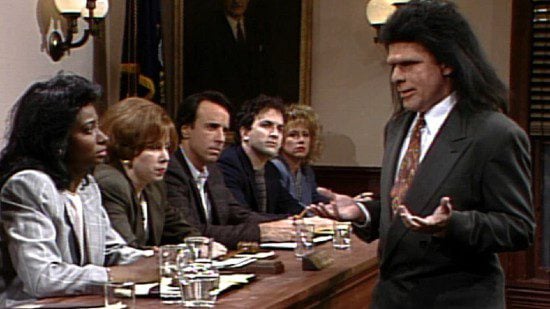The story of Noah in the book of Genesis does not invite a “literal” reading. It cannot even be made to tolerate such a reading.
This is not a historical story. It is not told to say, “Here is a thing that really happened and I am telling it to you, first of all, so that you will know that this was a thing that really happened.”
It is not that kind of story. The story itself tells us it is not that kind of story. And thus to read it that way is to fail to listen to what the story itself is telling us. To read the story of Noah as a historical account is to contradict the book of Genesis.
When we treat a story of one kind as if it were a story of another kind, we ruin the telling of it. We become exactly like That Guy who won’t let you finish a joke. (“Wait — you can’t bring a duck into a bar. The health code …”)
That Guy only comes in two varieties. He’s either so dim that he doesn’t understand how stories work and thus has completely failed to notice all the clear signals as to what kind of story is being told. Or else he’s just a jerk who’s trying to ruin the story on purpose so that we never get to the punchline.
“So this Southern Baptist minister, a Catholic priest, and an imam walk into a bar. Bartender looks up and says …”
“No way. A Catholic priest maybe, but a Southern Baptist minister and an imam would never go to a bar.”
“…”
“They’re teetotalers. They think drinking alcohol is a sin.”
“OK. Fine. Make it a Presbyterian minister, a Catholic priest, and a rabbi.* They walk into a bar. Bartender looks up and …”
“So which is it? A rabbi or an imam? I doubt this ever really happened at all! Just where is this bar supposed to be, anyway?”
That Guy is technically correct. But he’s also an idiot who doesn’t grasp the kind of story being told.

But there’s one thing more annoying than trying to tell a story over the clueless interruptions of a That Guy who misunderstands the kind of story being told — trying to hear a story told by a That Guy who misunderstands the kind of story he’s telling.
In both cases, the story will be ruined. Try to turn the one about the guy with the duck under his arm into a journalistic report and you’ll wreck the punchline. You’ll never convey the moral of the story about hard work and discipline if you wind up focusing, instead, on defending the notion that ants and grasshoppers are capable of speech.
So whether you’re reading, hearing or telling the story of Noah, you’re bound to make a mess of it if you don’t respect the story enough to treat it as the kind of story it presents itself to be. Treat it otherwise — treat it as a historical account — and you will inevitably miss what the story itself is saying.
Rep. Joe Barton of Texas provided a neat illustration of this yesterday when he attempted to invoke the story of Noah as a historical account:
Republican Texas Rep. Joe Barton on Wednesday dismissed concerns that the Keystone XL pipeline could contribute to climate change, citing the biblical flood myth described in the book of Genesis as evidence that climate change was not man made.
… In contrast to Barton’s past insistence that global warming science is “pretty weak stuff,” the Texas Republican took a different tack in Wednesday’s hearing.
“I don’t deny that the climate is changing,” he said. “I think you can have an honest difference of opinion on what’s causing that change without automatically being either all-in that it’s all because of mankind or it’s all just natural. I think there’s a divergence of evidence.”
“I would point out if you’re a believer in the Bible, one would have to say the Great Flood is an example of climate change. And that certainly wasn’t because mankind overdeveloped hydrocarbon energy.”
(What is it with Texans and the complete inability to understand the story of Noah’s Ark?)
Poor Barton reminds me of the American church group I met at the “Good Samaritan’s Inn” — a museum/gift shop for tourists and pilgrims along the Wadi Qelt in the West Bank. They were very excited to be at the “actual location” where the Good Samaritan in Jesus’ story took the man who had fallen among thieves. For them, it was a confirmation that the story “really happened.”
Except that the story did not “really happen.” The story never claims to have really happened. It was a parable. Parables are not fables, and we shouldn’t try to reduce them down to some “moral of the story” slogan, or to say “this and only this is the point of the story.” The story of the Good Samaritan is told to teach us several things, I think, but none of those things is that “this really happened.” It’s not that kind of story. And if the main thing you take away from the parable of the Good Samaritan is “this really happened,” then not only have you learned a false lesson, you’ve failed to learn any true ones.
You wind up, in other words, in the same illiterate, ignorant bind as Rep. Joe Barton.
Barton appeals to the story of Noah to argue that: 1) climate-change has nothing to do with human behavior; and 2) since humans are not responsible for causing climate change, we are not responsible for responding to it or mitigating its effects.
If “you’re a believer in the Bible,” or if you’ve ever read or heard the story of Noah, then you know that Barton is getting the story backwards and upside-down. The great flood in the story of Noah is a direct consequence of human behavior. Noah’s flood is, in that story, anthropogenic climate change. Genesis 6 does not say:
The Lord saw that the wickedness of ostriches was great in the earth, and that every inclination of the thoughts of their hearts was only evil continually. And the Lord was sorry that he had made ostriches, and it grieved him to his heart. So the Lord said, “I will blot out from the earth the ostriches I have created …”
Not ostriches. Humankind. (“Adam” is the actual word there.) The story is very clear that humans are to blame.
And because humans are to blame for bringing this destructive wrath down on the whole world, humans are also given the responsibility to rescue the rest of the creation.
This is not a minor point in the story. It is impossible to read this story or to hear this story or to tell this story without very clearly understanding that this story is saying that: 1) humans are uniquely capable of destroying all of creation; and 2) humans are uniquely responsible to care for all of creation.
Or, rather, it is almost impossible to read, hear or tell this story without understanding that. It’s possible to miss that point if you’re completely confused as to what kind of story you’re reading, hearing or telling. If you ignore or reject everything the story signals about what kind of story it is, then you can also ignore or reject everything the story has to say, focusing instead on what the story doesn’t say — that it is a historical account, the testimony of actual events from witnesses the story itself says cannot exist.
Focus on that and the story becomes something else — a tale of cubits, blueprints and cryptogeology. Read or told that way, the story no longer has anything to say about responsibility. That’s convenient for folks like Joe Barton, for whom avoiding responsibility is the whole point in quoting the Bible.
So which kind of That Guy is Rep. Barton? Is he the clueless idiot who doesn’t understand how stories work? Or is he the jerk who deliberately tries to ruin the punchline? I think probably it’s a little of both.
The good news for Joe Barton is that he’s from Texas. That means even after embarrassing himself with clueless statements like the one above, he still doesn’t ever have to worry about being the most embarrassing member of his congressional delegation. Heck, he doesn’t even have to worry about being the most embarrassing Barton from Texas.
– – – – – – – – – – – –
* The punchline is “Bacon,” so really it works either way.












